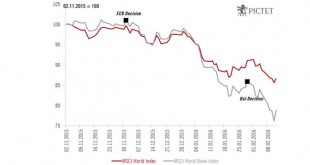The ECB announced measures that exceeded expectations, targeting the refi rate, its monthly asset purchases, a new corporate bonds purchase programme, new TLTROs and a negative rate. The deposit rate was cut as expected, but Draghi said that “no more cuts” were anticipated at this stage. The ECB’s Governing Council delivered a comprehensive policy package that exceeded market expectations by a large margin. The 10bp deposit rate cut to -0.40% was expected but other measures were not,...
Read More »ECB monetary policy: same player, different target, shoot again
Our baseline scenario remains for the ECB to announce a comprehensive policy package including a 10bp deposit rate cut (along with a tiered deposit system), a EUR20bn increase in the pace of asset purchases to EUR80bn per month (along with changes to QE modalities), as well as more attractive TLTRO operations. This time is different – it’s no longer about oil At first glance it feels as though market participants have gone all the way back to three months ago, when they were expecting a...
Read More »Euro area: large drop in core inflation delivers the final blow to the ECB
Today’s inflation report raises the likelihood of an even bigger easing package to be delivered at the 10 March meeting. Not only were today’s preliminary inflation figures for the euro area very weak, but the breakdown raised new concerns over the underlying trend in consumer prices – a potential headache for the ECB, independently of recent developments in the real economy and financial markets. According to Eurostat’s estimates, euro area HICP inflation fell to -0.19% y-o-y in...
Read More »Euro area: Credit rebounds sharply
After a large and unexpected fall in December, largely due to a collapse in lending to non-financial corporations in the Netherlands, euro area bank credit flows rebounded sharply in January, in line with other indicators such as the ECB’s Bank Lending Survey We continue to believe that the credit cycle has legs and we therefore maintain our forecast for the euro area GDP growth unchanged at 1.8% for 2016. Nevertheless, we also remain cautious. January bank credit flows came before the...
Read More »Euro area: Revisiting the ECB’s Lower Bound
Financial stress is threatening the fragile euro area recovery, especially the credit cycle. More negative rates are likely to be part of the ECB’s response We expect the ECB to cut the deposit rate to -0.50% by June, probably in two steps (by 10bp in March and by another 10bp in June), as part of its response to weaker inflation prospects and tighter financial conditions. That said, the adverse consequences of negative rates are becoming increasingly visible as foreign central banks are...
Read More »The dark side of negative interest rates
Recent equity market peaks coincided with the ECB and BoJ decisions to impose negative rates. From December 1st to last Friday, the MSCI World index declined by 14%. During the same period, the MSCI world banks index declined by 24%. Recent chronology of events Since 2009 and up until recently, central bank action has helped to stabilise equity markets. Looking at recent events, it now seems that the opposite is becoming true. The last two monetary decisions (ECB on 3 December 2015 and BoJ...
Read More »Euro area: good and bad reasons to worry about the euro area outlook
With downside risks to the euro area outlook intensifying in recent weeks, we expect the ECB to respond by easing monetary conditions further. We leave our 1.8% growth expectation for 2016, largely based on improving prospects for domestic demand. Although we have left our forecasts for euro area GDP unchanged – 1.8% growth expected in 2016, well above trend – downside risks have intensified in recent weeks. There are both good and bad reasons to worry about the recovery but, in short,...
Read More »Euro area: little evidence of large second-round effects of oil on core inflation
Much of the ECB’s decision at the upcoming 10 March meeting will depend on the assessment of the effects of lower oil prices on inflation. We find little evidence at this stage of large second-round effects on consumer prices. Draghi’s latest hint at fresh monetary easing heralds a six-week period of waiting and guessing what the next measures might look like. One critical factor driving the decision will be the ECB’s assessment of indirect effects of lower oil prices on inflation....
Read More »European monetary policy: new ECB easing package now likely to be announced in March
ECB policy rates will remain “at present or lower levels for an extended period of time”. Another deposit rate cut, to -0.40% or even lower, looks likely to be part of the ECB’s toolkit, especially if the Fed turns more cautious in the meantime. The ECB left all policy settings unchanged at today’s meeting, as widely expected. At the same time, the overall tone of the press conference reflected yet another significant dovish shift in the ECB’s communication – one that the Governing...
Read More »Currencies: persistent market volatility should support funding currencies
The risks implied by the Fed’s tightening cycle and the new Chinese monetary regime, among other things, will favour funding currencies over carry currencies in the next twelve months. Instead of looking at single currencies, it is sometimes interesting to look at broader themes to have a better understanding of how a certain group of currencies might behave. Among the best-known themes or strategies are carry trades, which are based on the principle of systematically buying...
Read More » Swiss Economicblogs.org
Swiss Economicblogs.org







